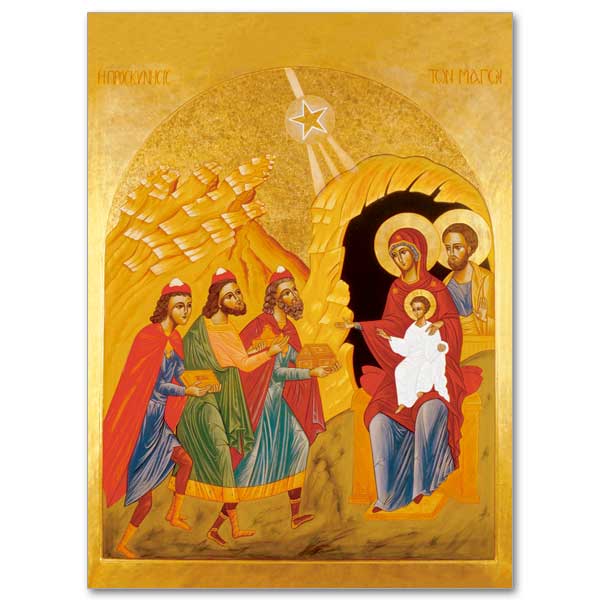The Gift of the Magi Themes
Table of Content
Also note that Della’s hair here represents her own external beauty and youth. Both the characters in the story, Della and Jim, inadvertently give each other worthless gifts for Christmas. Della buys Jim a chain for his watch by using the proceeds from selling her hair to an upscale salon. At the same time, Jim, blissfully unaware of what Della has done, buys his wife a set of fancy combs using the money he received from selling his watch. Each wanted to give the other something special for Christmas, but now they've both been lumbered with things they can't actually use. The narrator suggests that Della’s hair is beautiful enough to devalue all of the wealth of the Queen of Sheba and that Jim’s watch is fine enough to be envied by King Solomon.
When Jim comes home from work that evening, Della admits to him that she sold her hair to buy him the chain. Jim gives Della her present – a set of ornamental combs, which she will be unable to use until her hair grows back out. Della gives Jim the watch chain, and he tells her that he sold the watch to buy the combs.
Material versus Spiritual
However, they are very poor and don’t have the money to buy the gifts that they want to give. I’m not sure how much Jim has, but it’s not much. They want to buy each other really nice gifts, but as you know, it’s hard to buy really nice gifts for a $1.87 or less. Jim has this really nice watch that Della thinks would look really good on a brand new chain. Della has really nice hair that Jim thinks would look great adorned with brand new combs.

In "The Gift of the Magi", what quote can be used to link to a theme of "material items bring joy". Henry follows Jim and Della, a young struggling couple, around Christmastime. Teaching the Reading Literature Common Core Standards are easy with short stories. These assignments cover the following ELA common core standards for reading and writing.
What is the theme of the story “The Gift of the Magi” by O. Henry?
It is fitting, then, that both Jim and Della decide to sacrifice their prized belongings not in order to change their material circumstances but rather to buy a sentimentally motivated gift for their partner. Though the combs and the watch chain are given monetary value, it is the sentiment behind each gift that makes them truly meaningful. Della and Jim may remain materially impoverished, but their exchange of functionally useless Christmas gifts only serves to emphasize the wealth of love that exists between them. Henry contrasts the warmth that exists between Della and Jim with their bleak surroundings. The most prominent theme in “The Gift of the Magi” is love. Jim and Della are willing to part with their most prized possessions to make each other happy, demonstrating that a wealth of love makes up for material poverty.

Some additional themes are generosity, selflessness, and poverty. The central theme of “The Gift of the Magi” is explicitly discussed at the end of the story, when the author addresses the reader directly, relating his characters to the wise men in the Bible. On Christmas Eve, Della Young discovers that she has only $1.87 (equivalent to about $62 in 2022) to buy a present for her husband Jim. She visits the nearby shop of a hairdresser, Madame Sofronie, who buys Della's long hair for $20 (about $600 in 2021). Della then uses the money to buy a platinum pocket watch chain for Jim.
'The Gift of the Magi' Discussion Questions
Both Jim and Della give selflessly, without expectation of reciprocity. Their sole motivation is to make the other person happy. This, combined with the personal meaning imbued in each of the gifts, conveys the story’s moral that true generosity is both selfless and thoughtful. Della sells her hair to a wig maker to buy a chain for Jim's watch for Christmas. Unbeknownst to her, however, Jim sells the watch to buy her a set of prized hair combs. Each gave up their most valued possession to get a gift for the other.
The main idea of “The Gift of the Magi” is that the value of a gift is in the giver, rather than the gift itself. Madame Sofronie’s cold evaluation of the dollar value of Della’s hair directly contrasts with its value to Della and Jim. To Madame Sofronie, it’s worth no more than the money she can get for it. Della demonstrates her love for Jim by sacrificing her own most prized possession—and external beauty—without a second thought.
For a young couple living in such economically strained circumstances, it is unlikely that their possessions truly rival those of biblical royalty. However, the items are considered valuable for more than just their material worth. Della’s hair represents her beauty and femininity, and for it to have reached such a length, she must have been growing it out for years. Jim’s watch is an heirloom that was passed down from his father.

The beginning moments of the 2002 special It's a Very Merry Muppet Christmas Movie feature gags based on the story. For example, while Rizzo the Rat sells his collection of rare cheese to buy Gonzo a dish for his mold collection, Gonzo reveals he sold his mold collection to buy Rizzo a cheese slicer. In 1993, an episode of Mystery Science Theater 3000 had TV's Frank selling his hair and buying Dr. Forrester a watch fob. However, Dr. Forrester did not sell his watch to buy Frank a comb, merely thanking Frank for the watch fob for his still-owned watch.
In the story, "a tear or two ran down her face" when Della decides to cut off her hair to make $20 for her husband's gift, a gold chain for his watch, his most precious possession. Ironically, if not surprisingly, Jim has sold his watch to buy combs for his wife's most precious possession, her hair. This is a reference not to the combs and watch chain they gave each other, but to their giving of themselves. At Christmastime, Jim and Della want to do something special for the other, however. Unable to squeeze enough money out of Jim's paycheck to buy a gift, they each sell their most prized possession.
Be sure to explain connotation and tone (the specific emotions of the author, speaker, characters, etc.). I love analyzing characters, whether the character is in a poem, book, play, television show, or even a movie. So let’s help our students examine characterization with ease. The combs are beautiful and expensive on the outside—but with Della’s hair gone, their external value is diminished. However, they still have the same sentimental value, coming from Jim.
The main idea of "The Gift of the Magi" is that the value of a gift is in the giver, rather than the gift itself. Jim and Della, out of their love for each other, purchased a gift that required them to sacrifice something that was precious to them. Though that sacrifice thus made the gifts impractical, nevertheless they showed themselves to be understanding of true giving, true sacrifice, and true love. As Henry says, "Of all who give and receive gifts, tsuch as they are wises. Everywhere they are wisest. They are the magi." Jim and Della sell their most prized possessions in order to buy the other a special Christmas gift, but the gift each buys is specifically designed for the prized possession each one sold.
W.9-10.3d Use precise words and phrases, telling details, and sensory language to convey a vivid picture of the experiences, events, setting, and/or characters. Instruct students to write a story about a time they got a really crappy gift for Christmas. Then the Internet was invented and “Gift of the Magi” activities and lesson plans became easy to find. Which instigates the moral reflection that teaching is made up of sobs, sniffles, and smiles, with smiles predominating. They know the words “positive” and “negative,” but identifying a specific tone is a feat for most students.
When they discover their actions have canceled out each other's gifts, they reveal what matters most to them. Rather than regretting what they have lost, they recognize they have something of far greater value—their love and concern for each other. Jim tells Della he will continue to like her no matter what she does to her hair. Della confirms her love for her husband is greater than the length of the hairs on her head. The question of whether Jim and Della are wise or foolish in “The Gift of the Magi” depends on one’s perspective.
Comments
Post a Comment